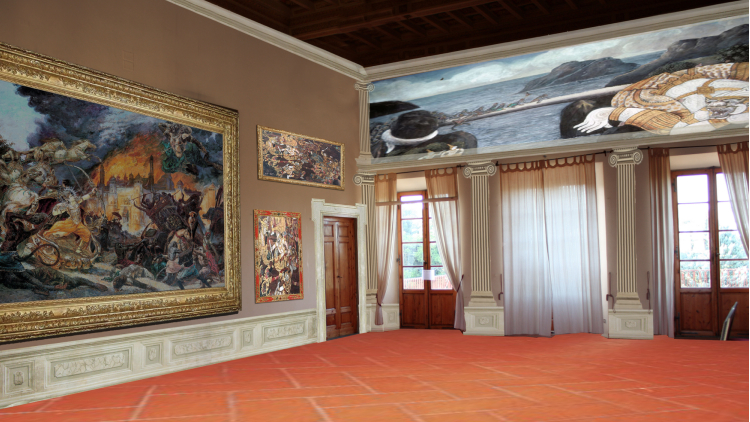Ramayana Collection to Open at Villa Vrindavan Museum
By Madhava Smullen | Mar 21, 2014

On Friday July 11th, the second floor of the Museum of Spiritual Art (MOSA) in Villa Vrindavana, Italy will be completed and receive an internal opening ceremony attended by devotees.
The museum is the second branch of MOSA in ISKCON, modeled after the original in Radhadesh, Belgium. It is located in the most historic part of Villa Vrindavana’s Villa, dating back to the 16th century.
In July last year, its first floor opened to reveal a collection of 20 paintings depicting the ancient Indian history The Mahabharata. Created by Italian artist Jnananjana Das over a five-year-period, they show in vivid realism scenes such as Princess Kunti calling out to the Sun God, Krishna displaying His universal form, and Arjuna and Krishna riding into battle.
This year, the new Ramayana collection will feature around 23 paintings by US artists Ram Das and Dhriti Dasi, a husband and wife couple who created some of the early BBT paintings for their spiritual master Srila Prabhupada, as well as more by Jnananjana.
The paintings, which will vary in size and include two huge 3.5 x 2.5 meter pieces, will depict scenes from the life of Lord Ramachandra, one of the main avatars of Krishna, including His life as a boy in Ayodhya, His exile in the forest, and His battle with the demon Ravana.
Most of the paintings will be brand new. But one of the centerpieces will be Jnananjana’s famous work, created 30 years ago in Villa Vrindavana, showing Lord Rama standing on His chariot and piercing Ravana as the demon flies through the sky.
The paintings will be spread throughout one great hall and four other large rooms on the 400 square meter second floor of the museum.

“The second floor will also include a Prabhupada room where visitors can see a history of the Gaudiya Vaishnava disciplic succession and a murti of Srila Prabhupada,” says Villa Vrindavana president Parabhakti Das. “We wanted them to be able to meet the founder of our movement and the inspiration behind the museum’s paintings.”
Around 250 devotees are expected for the inauguration of the second floor, including MOSA Belgium’s director Mahaprabhu Das and GBCs Hridaya Chaitanya Das and Madhusevita Das.
They will bring small Deities of Radha-Vrajasundara to preside over the ceremony, cut the ceremonial ribbon, circumambulate the temple, and tuck into a delicious feast. They will of course also get the first chance to gaze upon the gorgeous new works of art.
Although the museum is not officially open to the public yet, it’s already getting around 150 visitors per month, with Sunday guests as well as local people or tourists dropping by and asking to see the Mahabharata artwork already on display.
After the official opening in late April 2015, which local politicians and members of the nearby Florence tourist board are expected to attend, Villa Vrindavana will go into full on promotion mode and Parabhakti hopes to draw twenty to thirty thousand people per year.
Busloads of school children are expected along with tourists. All are likely to be fascinated at seeing a piece of Indian culture presented within an historic Italian Villa near Florence, one of the most famous centers of art in the world.
As well as the permanent painting collections, visitors will be treated to temporary exhibitions of photos, sculptures, paintings and other types of art on broad themes of Vaishnava and Indian culture by various devotee artists.
Statues of sacred figures such as Brahma, Shiva, and Vishnu from various parts of India will also be on display, while some scenes from ancient India will be recreated. In the future, there will also be a painting collection on the pastimes of Lord Krishna.
In addition, the museum will not just be a static display of art; it will be a living, breathing space. “We plan to host conferences, music performances, poetry shows and dinners inside,” says Parabhakti.
Along with the museum’s official opening in 2015, other new Villa Vrindavan projects will also be inaugurated, including a new shop, an educational goshala (cow shelter), and a renovated entranceway to the property. People visiting the museum will be able to take a tour of these and of the temple, where they can learn a little about Krishna consciousness and receive a brochure.
But no one will be trying to convert them. Parabhakti feels that people are put off by the idea of visiting a “religious” place, where practioners try to push their views on them. But they love to learn about the fascinating ancient history and culture of India and the events of the Bhagavad-gita as presented in the museum, and often begin to appreciate these and ask questions about them.
“I think this museum will give something valuable to the local community, give credit to our movement, and help integrate Villa Vrindavana into society,” Parabhakti says.















